Heating systems used in cold climates either convert electricity to heat or burn fuel to produce heat. However, air-source heat pumps work differently because they don’t produce heat. These devices are more efficient for heating purposes as they bring the existing heat energy from the surroundings into your home.
Simply put, a heat pump is a device that moves heat from one place to another. The device allows you to generate renewable heat. Unlike boilers, air-source heat pumps can achieve up to 600% efficiency. This is because the amount of heat produced by the pump is greater than the energy it consumes. Not only does this make air source heat pumps more environmentally friendly than other heating options, but it also makes them more affordable in the long run. So if you’re looking for a way to lower your heating and cooling costs, an air-source heat pump might be the right choice.
We extensively researched several businesses and products to create a list of the top air-source heat pumps. We’ve thoroughly researched the leading brands on the market, accounting for various variables crucial when selecting an air source heat pump. Let’s dive in.
Table of Contents
- The Top 5 Best Air Source Heat Pumps
- 1. Hitachi Yutaki – Best for Efficiency
- 2. Nibe F2040 – Best for Small Homes
- 3. Vaillant aeroTherm – Best Power Output
- 4. Grant Aerona R32 – Best for Budget
- 5. Samsung Eco Heating System – Best Compact Design
- Best Air Source Heat Pumps: Buying Guide
- Frequently Asked Questions (FAQs)
- Conclusion
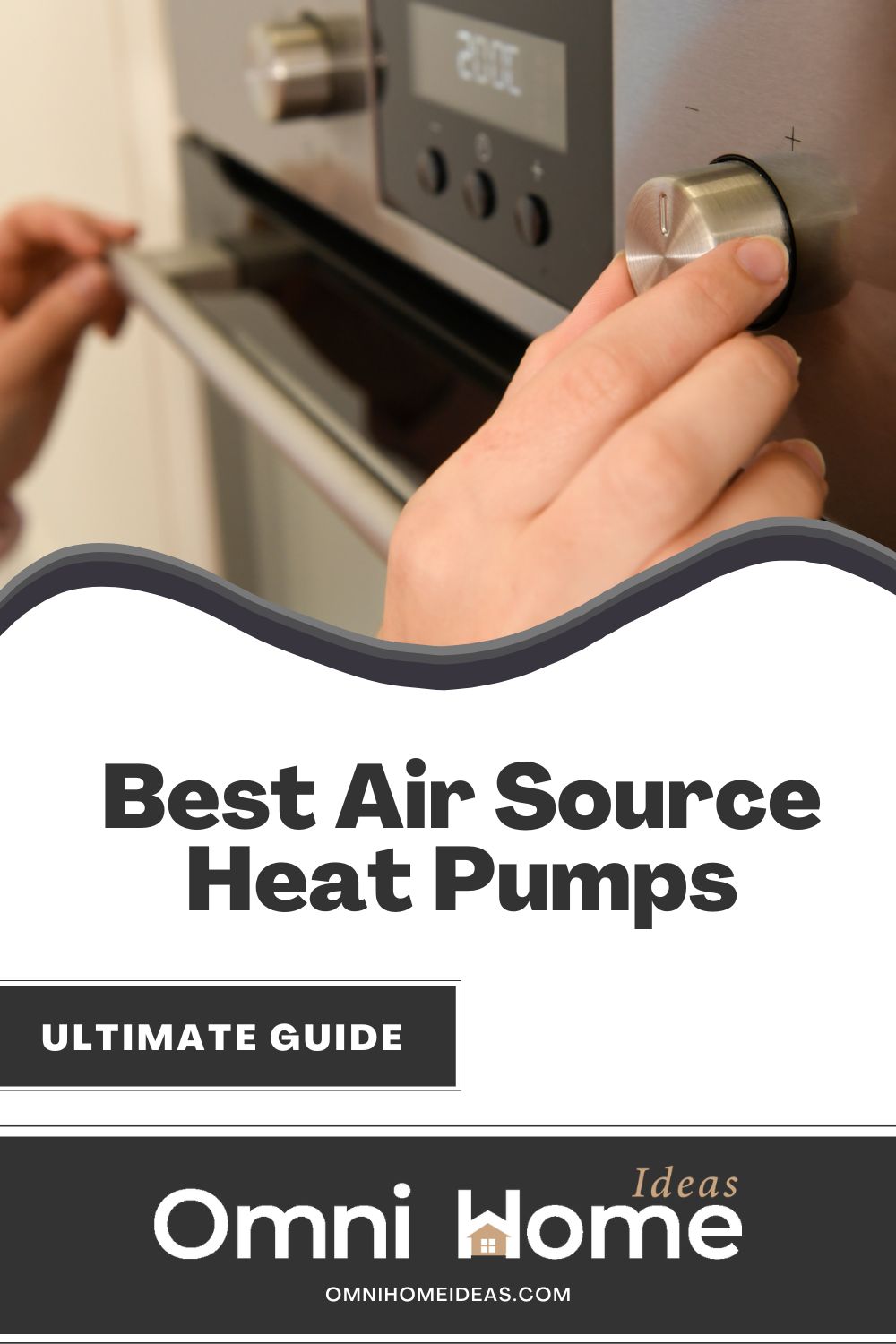
The Top 5 Best Air Source Heat Pumps
The following are our top picks for the best air-source heat pumps:
- Hitachi Yutaki – Best for Efficiency
- Nibe F2040 – Best for Small Homes
- Vaillant aeroTherm – Best for Maximum Power Output
- Grant Aerona R32 – Best for Budget
- Samsung Eco Heating System – Best Compact Design
1. Hitachi Yutaki – Best for Efficiency
Hitachi Yutaki is a medium-sized air source heat pump that can reach a peak efficiency rating of up to 500%. The air source heat pump features high-quality components and is well-designed. Hitachi is a well-known Japanese manufacturer that uses advanced technology to create a sustainable society.
The air source heat pump reduces carbon dioxide emissions and power consumption by 60% compared to traditional heating methods. The Hitachi Yutaki transforms the air outside your home into heat energy using the mechanisms of refrigeration and vapor compression.
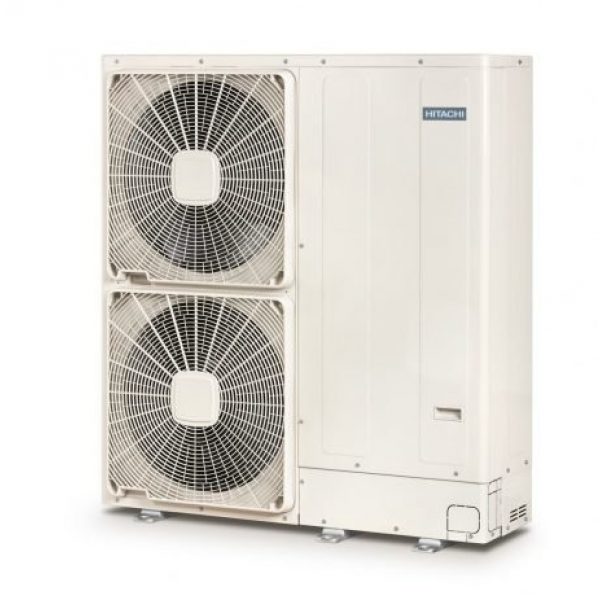
Features
The Hitachi air source heat pump has a heating capacity of 11 kW and can provide a maximum heating temperature of up to 80 degrees Celsius. The hot water storage tanks are integrated with the indoor units, and the outdoor units feature a smart defrost feature for maximum efficiency. Because of its high-efficiency rating, it is five times more efficient than a gas boiler. The heat pump is compact and powerful and features an intuitive design that allows you to adjust room temperature with the touch of a button.
The air heat pump has a small and simple design and some user-friendly features. For instance, it has a one-touch button system that allows you to enjoy vacation mode when you’re not at home. Besides that, it comes with a wireless remote control that helps you change the temperature from anywhere. The Hitachi heat pump isn’t equipped with a traditional electrical element; instead, it comes with a Cascade R134a heat pump circuit. This circuit improves the system’s efficiency rating and makes it a perfect choice for cold climates.
Pros
- Operates quietly
- Saves money in the long run
- Easy to install and maintain
- Hot water on demand
- Lowers carbon footprint
Cons
- Expensive
- Low maximum power
2. Nibe F2040 – Best for Small Homes
Nibe is a reputable company established in 1952 and is well-known for manufacturing air-source heat pumps. The company’s engineering culture makes it possible to design the most intelligent and advanced heating systems. Their heating units are powerful and easy to install.
Nibe is a Swedish company specializing in heat pumps and providing a range of accessories to provide users with advanced heating solutions. Their air source heat pumps are designed to ensure easy installation through anti-vibration water connections. The Nibe F2040 model is five times more efficient than traditional gas boilers. Besides that, the air source heat pump also comes with a seven-year warranty.
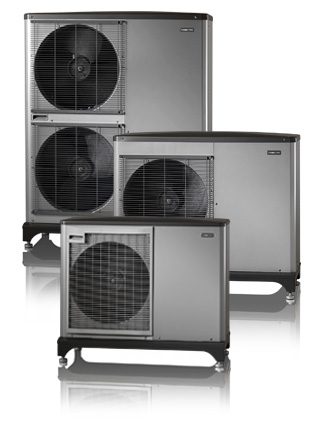
Features
Nibe F2040 is an efficient air source heat pump that can work in temperatures as low as -20 degrees Celsius. The device operates quietly and comes with smart technology and Wi-Fi integration. It has a 6kW to 16kW output that supplies up to 58 degrees Celsius. The unit features an inverter-controlled compressor, which is suitable for residential uses. There is a built-in condensate water tray and a monobloc outdoor fan unit that you can control using advanced integrated technology.
The Nibe air source heat pump also comes with a user-friendly mobile app that allows you to manage the heat pump more efficiently. The app allows quick access to various features and allows you to update the system easily. Nibe F2040 is suitable for small to medium-sized homes. Its blades allow quite an airflow, and the anti-vibration connections improve the overall functionality. Nibe F2040 has a low operating temperature, simple installation, high output, and high efficiency.
Pros
- Reduces carbon footprint
- Saves on energy costs
- Operates quietly
- Heats home throughout the year
- Simple installation
- Compact design
Cons
- Poor customer service
- High upfront cost
3. Vaillant aeroTherm – Best Power Output
The Vaillant Group is a multinational company with decades of experience providing energy-related solutions to end users. The company has manufactured numerous high-quality HVAC products, but they are most popular for their advanced heat pumps and boilers. It is a Germany-based company that provides services to more than 20 countries across the globe.
The company is one of the largest creators of heating units in Europe and is popular for manufacturing advanced air conditioning and ventilation technologies. Vaillant AroTherm is a high-quality air source heat pump that allows homeowners to meet various heating needs.
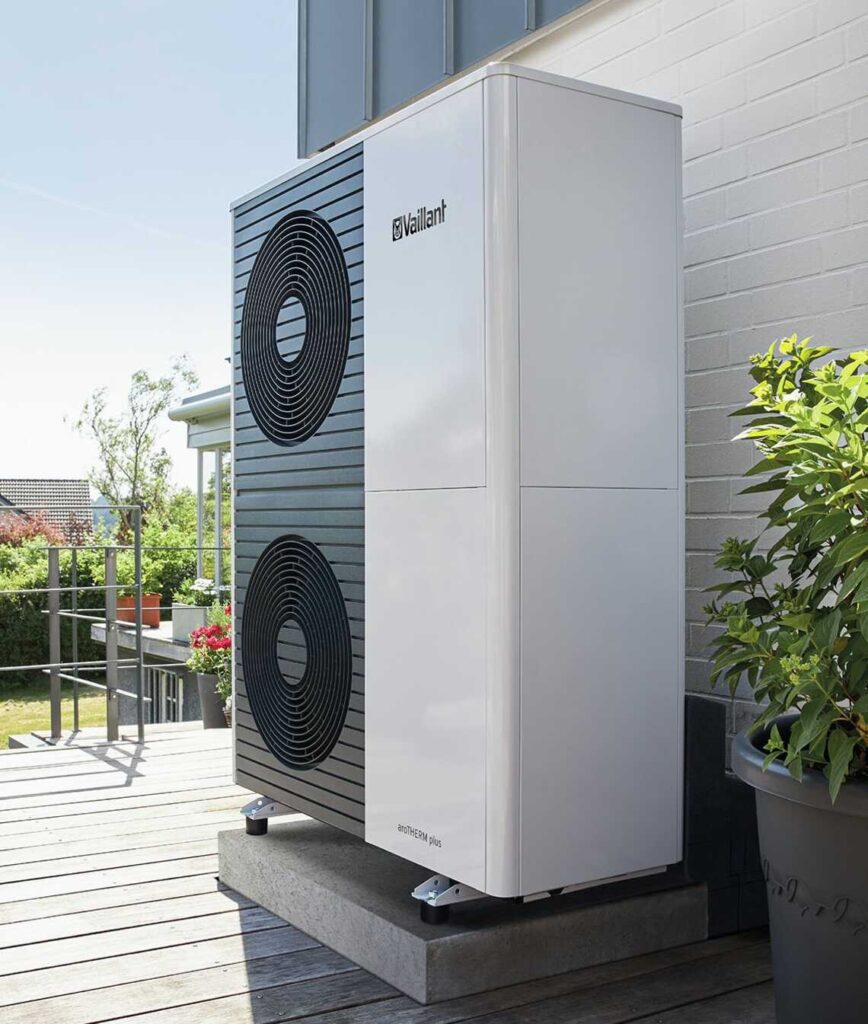
Features
The Vaillant aerotherm has a metallic design and an overall compact structure that can fit seamlessly anywhere. The aerotherm is available in four different sizes and outputs to match the requirements of different types of homeowners. The air source heat pump is very environment-friendly and highly efficient. Some of the units available with this range use R290 refrigerant, which is very beneficial in terms of its global warming potential. The Vaillant aroTherm uses two types of outdoor units, which include split and monobloc.
The air source heat pump is good for underfloor heating and low-temperature radiators. However, the unit requires separate hot water storage for hot running water. The aeroTherm is highly energy efficient, requiring less power to run the unit. Besides that, it is a better option as it reduces carbon footprint. The unit has a flow temperature of up to 75 degrees Celsius and provides more usable water. The aeroTherm plus also allows the users to operate with the smart grid. Overall, it is a good option for those looking for an energy-efficient option for keeping their homes warm.
Pros
- Environment-friendly
- Comes with a seven-year warranty for labor and parts
- Good for all types of homes
- Low global warming potential
- Integrated hot water storage tank
Cons
- Complex installation
- A bit expensive
4. Grant Aerona R32 – Best for Budget
Grant Aerona R32 is an advanced, environment-friendly air source heat pump. Its manufacturer, The Grant, is a reliable and well-known heating company that has been designing high-quality heating units for decades.
The company has won various awards for designing high-end heat pumps that help achieve renewable energy targets. The company develops innovative technology and ensures that its devices meet performance guidelines. Their heat pumps are durable and efficient, as they never compromise on quality.
Grant is also determined to achieve the 2050 zero-carbon goal by introducing environment-friendly technology. Aerona R32 is a single-phase heat pump with built-in circulating technology.
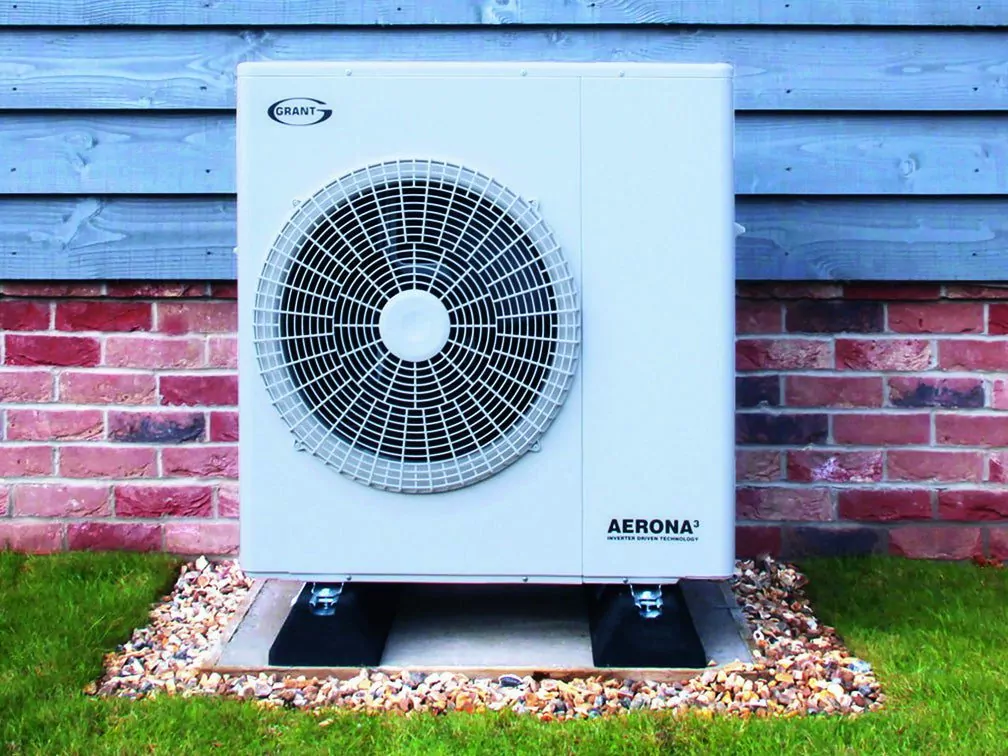
Features
The Grant Aerona R32 uses R32 refrigerant, which has a lower GWP (Global Warming Potential). The refrigerant is a single-molecule substance that reduces the risk of temperature glide. It can operate in cold climates with temperatures up to -20 degrees Celsius. It is one of the most affordable heat pumps and still provides an efficiency rating of up to 479 percent. This means that the device produces 4.79 units of heat for every unit of electricity. The device is suitable for low-temperature radiators and underfloor heating. It is DC-inverter driven and has a compact footprint. For users looking for a cost-efficient and quiet heat pump, the Aerona is an ideal option.
Pros
- Easy and quick installation
- In-built weather compensation
- Compact footprint
- Quiet operation
- Environment-friendly
- 5- year guarantee
Cons
- A separate hot water cylinder required
- Only low-temperature heat pumps in this range
5. Samsung Eco Heating System – Best Compact Design
Samsung is a household name; it has been manufacturing numerous high-quality products since 1938. The company uses innovative technology, and they provide products for sale across the globe. Its air source heat pumps feature smart, advanced, and integrated technology to provide efficient solutions. The main aim of Samsung’s heating technology is to improve energy efficiency and reduce overall operating costs. The Samsung Eco Heating system is a compact and self-contained heating unit that can operate in temperatures as low as -25 degrees Celsius. It is good for users who are looking for a slim and lightweight heat pump that could fit easily in the space available.
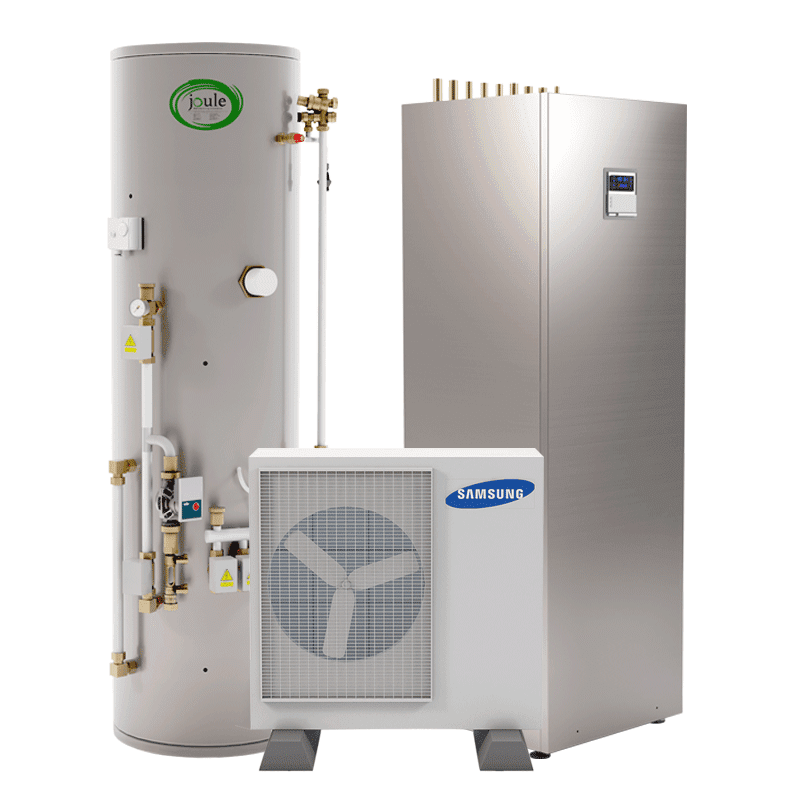
Features
Samsung Eco Heating System has air source heat pumps of different sizes; for instance, you can get a heat pump ranging from 5 kW to 16 kW of output. The Samsung EHS monobloc offers 16 kW of output. It provides good heating in all seasons and keeps you warm even when the weather is too cold. It has an eco-friendly design that helps reduce the carbon footprint. Besides that, the device operates exceptionally quietly. The unit comes with a detailed installation guide, which makes installation very easy.
The Samsung heating unit is suitable for residential as well as commercial environments. You can either wall-mount it or keep it on a platform as it has feet. The unit also comes with Wi-Fi kits that make managing and controlling functions easier. It takes heat from the external environment and sends it through a refrigerant. This helps keep the house warm and heats the water supply. The device heats water to a temperature of 65 degrees Celsius. Since it reduces the carbon footprint, it is a good option compared to traditional gas boilers.
Pros
- Very energy efficient
- Affordable heat pump
- Slim design
- Eco-friendly design
- Quiet operation
- Easy to install
Cons
- Not easily available
Best Air Source Heat Pumps: Buying Guide
These ASHPs, as their name implies, extract heat from the air around your home, even when it is cold outside. They then transform this heat into energy to run your home’s heating system and water heater. ASHPs are an incredible feat of engineering, and this is a complicated technological procedure. Since you might not be aware of the critical variations and characteristics among the many air source heat pump models, we’ll outline the most significant ones you should consider before purchasing.
Air Source Heat Pump Type
ASHPs come in two different varieties: air-to-water and air-to-air. For cooling or heating your home, air-to-air devices employ a series of fans, while air-to-water systems use the heat they produce to warm water that is then pumped to radiators for heating and stored in cylinders.
Therefore, the sole function of an air-to-water unit is to create heat from ambient air and transfer it to the water that circulates through your central heating system. While air-to-air pumps may heat or cool your air, air-conditioning systems are more comparable. However, remember that they are far more challenging to install than air-to-water types, so we’ll mainly concentrate on the more useful air-to-water heat pumps.
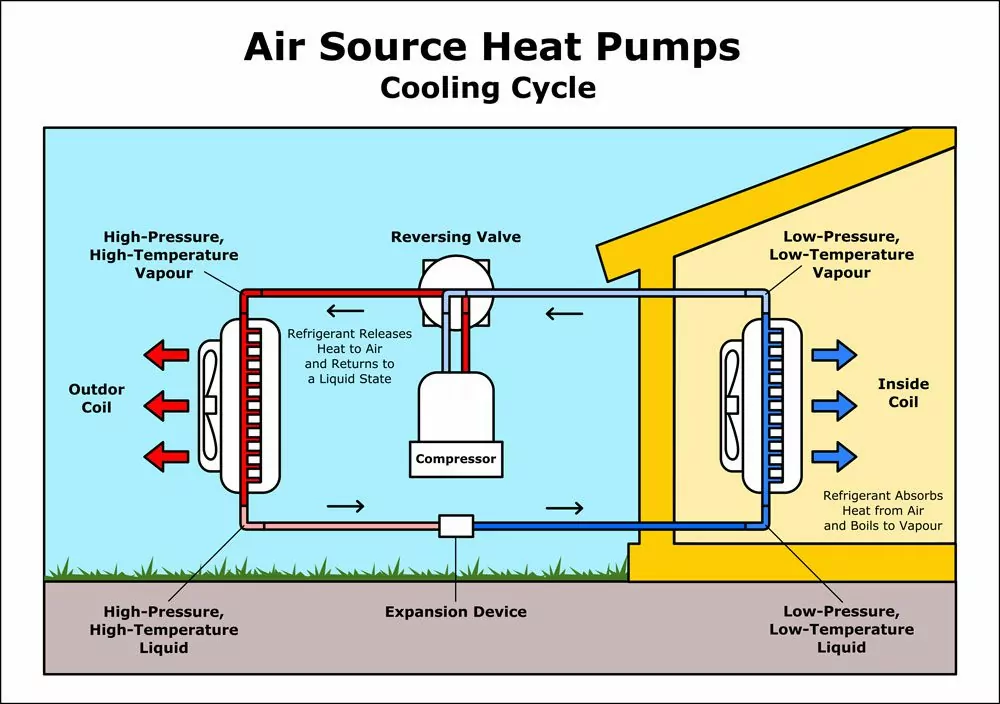
Temperature
The majority of air source heat pump manufacturers produce low-temperature and high-temperature variants. High-temperature units better suit typical central heating systems since they heat water to temperatures comparable to those of a gas boiler. At the same time, the low-temperature pumps are made for homes with low-temperature radiators or underfloor heating.
Split vs. Monobloc
In addition to temperature, we can distinguish between different air source heat pump models. Additionally, split and monobloc variants are available. While the former has an indoor and an outdoor unit, the latter has a single outdoor unit.
Both have advantages and disadvantages, but the bottom line is that because there is no inside unit with a monobloc air source heat pump, it requires less interior space than a split unit or a gas boiler.
Because they are self-contained and don’t need refrigerant lines to connect to an interior unit, they are significantly simpler to install (and hence less expensive). This also makes them simpler to maintain as a result.
The interior unit of a split air source heat pump is likely to include integrated hot water storage. However, most monobloc air source heat pumps require you to install a hot water storage tank separately.
Eco-Friendliness
The environmental friendliness of air-source heat pumps is one of their main selling points. The sole component of ASHPs that can harm the environment is the refrigerant utilized in their vapor compression cycle, as evidenced by these gasses’ GWP (global warming potential).
R290 is the most environmentally benign refrigerant, with a GWP of three, compared to carbon dioxide, which has a GWP value of one. The R32, which has a GWP of 677, and the R410A, which has a GWP of 2088, are other options.
Noise Level
Air source heat pumps do emit a certain level of noise. How much depends on the brand and the type of unit you’re using. Most heat pumps do emit a slight breeze and a low rattling noise. However, if you live in a city with several close neighbors, you must consider choosing a heat pump that’s as silent as possible. Also, if you have bedrooms on the ground floor of your home, clear a space for the heater away from resting places.
Frequently Asked Questions (FAQs)
1. How do ASHPs (Air Source Heat Pumps) function?
Although air source heat pumps may appear complex at first glance, their core principles are straightforward. Initially, air source heat pumps use heat from the ambient air and bring it to a higher temperature with their compressors. Since the cool refrigerant liquid is cooler than the surrounding air, heat is transferred from the air to the liquid as it is circulated through a cooling coil and another tube.
It works by evaporating the liquid and compressing the resulting vapor to transport the heat more efficiently throughout your house. The heated vapor is then transported to the air within your home through a secondary heating element.
The procedure is reversed when a heat pump is used to cool a house. The cryogenic coolant liquid draws heat from inside the facility and releases it outside, thus maintaining a constant temperature inside the house.
2. Can I use the air source heat pump around the clock?
Since having the heating pump on all day is both wasteful and costly, turning it on only when you need it is a far more practical option. Additionally, having a well-insulated home reduces the time it takes to reach the target temperature and makes the heat pump more efficient.
Heating an area to the appropriate temperature takes more time and energy when the amount of heat required exceeds the amount of heat lost due to insufficient insulation. The time you utilize your heat pump is also a significant factor in how much it will cost to operate.
3. How often and what sort of care must a heat pump receive?
It’s possible that the owner can perform certain repairs on his own. In addition to cleaning the entire apparatus, a trained technician will need to inspect the status of various technical components. Maintaining your equipment at least once a year can help you avoid any issues.
4. How long does it take to install a heat pump?
Installation of the new device requires the replacement of both the outdoor and indoor units, a process that typically takes three days to accomplish. One day is possible for a ductless system, but digging a borehole is a significant time commitment for ground source heat pumps.
5. Do I need to keep my current space heaters or furnace if I get a new heat pump?
While heat pumps are effective at keeping you warm, it is still smart to have backup heating options on hand. This is in case the temperature drops or if you happen to be in a location where the heat pumps are insufficient. When selecting a device, it’s crucial to consider any prerequisites specified in the building codes.
6. Are there any drawbacks to air source heat pumps?
Air source heat pumps use the heat from the surroundings to keep your home warm. However, if the temperature outside is too low, it is difficult for the unit to warm up the indoor environment. In very cold climates, the heat pump has to work harder. Thus in cold temperatures, the heat supply is lower than boilers. Plus, your home must be well-insulated for the air source heat pump to work properly.
Conclusion
So, what’s the verdict on heat pumps? Overall, they’re an excellent choice for many homeowners. They’re energy-efficient, durable, and can provide both heating and cooling. However, there are a few things to keep in mind before you buy. Make sure to research and choose a suitable pump for your climate and home. Also, heat pumps require regular maintenance like any other HVAC system. With proper care, your heat pump will keep you comfortable for years to come.
When compared to conventional heaters, installing an air-source heat pump might offer several advantages. For example, it can assist you in saving money on your power bill and promoting ecologically beneficial behavior.
All the air source heat pump manufacturers listed in this guide have been investigated and compared extensively. If you seek the most exemplary heat pump for your home, you will probably discover a suitable alternative on this list. You may choose a heat pump that matches your demands from this list because it offers the most reputable and well-known brands. Before selecting the best air source heat pump for your house, compare them thoroughly because they are all unique and have various qualities.


